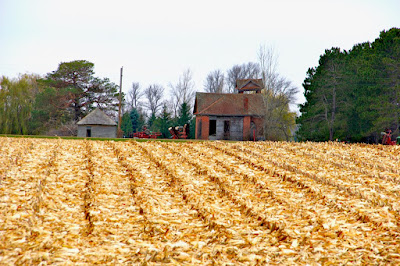 |
| how is field corn grown for ethanol different than shale oil fracking?
Photo by J. Harrington
|
The preceding background is prelude to a couple of farming-related resources I found this morning that I think are worth sharing. One is based in Maine, the other on the "other" coast. Greenhorns is "a community powered studio dedicated to grassroots media, cultural programming and land repair for the benefit of the human and non-human worlds.... "whose "mission is to promote, support, and recruit young farmers in America." A recent Greenhorn video provides a direct link to Minnesota as it explores "the works and service of farm-based Catholic worker communities in the upper Midwest. Dorothy Day, founder of the Catholic workers, was highly devout and profoundly independent: she emphasized direct action for peace and justice, and direct service for the poor." I've not yet explored all the resources on their site so there's much to look forward to.
 |
| farmer's markets offer local foods, sweet corn not field corn
Photo by J. Harrington
|
The other resource I found this morning includes readings of white papers by a favorite writer, systems modeler and person, Donella Meadows. Oregon State University has an online, short course, Introduction to Food Systems, in its Center for Small Farms and Community Food Systems. I've read the Meadows papers already and will review them again in the context of the videos provided as keys to the course. Each of these should complement nicely my ongoing reading of Rebuilding the Foodshed and Wendell Berry's Bringing It to the Table essays on farming and food.
[UPDATE: Unfortunately, the quality of the presentations in the Oregon short course severely detracts from the content. The Adobe Presenter movies have somehow cropped out large areas of some of the slides. I had similar problems on both my laptop screen and the 21" screen of my desktop computer.]
From what I've read so far, the web sites of neither the Land Stewardship Project nor the University of Minnesota system provide resources comparable to Greenhorns or OSUs. If any readers think I've missed something important on LSP's or UMN's web sites, please share a link in the comments. From the reports of the past several years, food, its production, processing and consumption, plus the wastes generated in those processes, offer great opportunities for reducing our carbon footprints and eating healthier foods. In fact, I'm not sure the Green New Deal legislation focuses enough attention on our food systems, but that's for other days and other posts.
A Poem on Hope
It is hard to have hope. It is harder as you grow old,
for hope must not depend on feeling good
and there’s the dream of loneliness at absolute midnight.
You also have withdrawn belief in the present reality
of the future, which surely will surprise us,
and hope is harder when it cannot come by prediction
anymore than by wishing. But stop dithering.
The young ask the old to hope. What will you tell them?
Tell them at least what you say to yourself.
Because we have not made our lives to fit
our places, the forests are ruined, the fields, eroded,
the streams polluted, the mountains, overturned. Hope
then to belong to your place by your own knowledge
of what it is that no other place is, and by
your caring for it, as you care for no other place, this
knowledge cannot be taken from you by power or by wealth.
It will stop your ears to the powerful when they ask
for your faith, and to the wealthy when they ask for your land
and your work. Be still and listen to the voices that belong
to the stream banks and the trees and the open fields.
Find your hope, then, on the ground under your feet.
Your hope of Heaven, let it rest on the ground underfoot.
The world is no better than its places. Its places at last
are no better than their people while their people
continue in them. When the people make
dark the light within them, the world darkens.
–Wendell Berry
********************************************
Thanks for visiting. Come again when you can.
Please be kind to each other while you can.
No comments:
Post a Comment